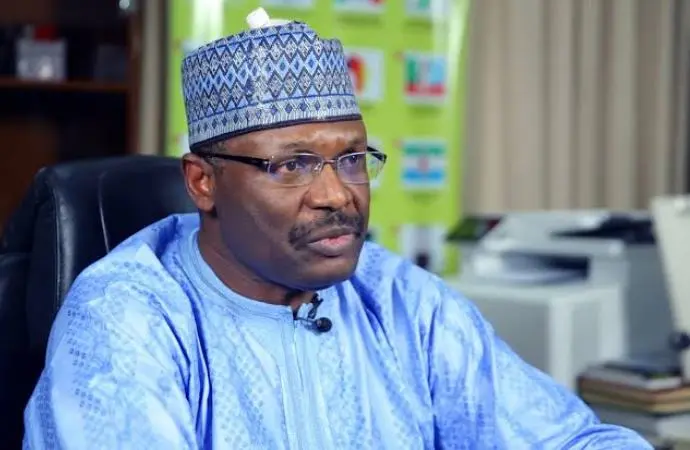POLITICS
FG released N313.4bn to INEC for 2023 General Elections, says INEC

The Independent National Electoral Commission (INEC) says the Federal Government released N313.4 billion for the conduct of the 2023 general elections.
The commission in its 2023 General Election Report released on Friday, said that out of the N355.b approved for the conduct of the elections, the sum of N313.4 billion was only released as at September 2023,.
According to the report, based on the key activities in the approved Election Project Plan for the 2023 general election, INEC proposed a budget of N305 billion for the conduct of the elections.
The breakdown of this amount showed that the commission asked for N159.7 billion for electoral operations; N117. 3 billion for electoral technology; and N20.4 billion for electoral administrative costs.
It also showed that N7.4 billion representing 2.5 per cent of the election operation, technological and administrative costs was set aside for unforeseen electoral expenses.
The report stated that in line with the provisions of the 1999 Constitution, the commission’s budget proposal for the 2023 general election was submitted to the presidency and duly transmitted to the National Assembly for approval.
“Consequently, the commission appeared before Senate and House Committees on INEC as well as the Senate and House Appropriations Committee in a joint session during which the INEC Chairman presented the expenditure layout of the budget and answered all questions and queries from Committee members.
“The National Assembly approved and appropriated the sum of N303.1 billion for the conduct of the 2023 general election,” it stated.
It, however, stated that by January 2023, it was clear that the approved amount would not be enough for the conduct of the election due to the inflation rate and consumer price index as well as the widening differentials in the foreign exchange rate.
It added that INEC was also faced the necessity to rebuild or relocate its operations from its buildings that were destroyed or burnt and replace lost election materials due to arson attacks and fire outbreak.
It also noted that INEC suffered more than 50 attacks on its facilities and vandalisation of properties and election material between 2019 and 2022.
These three factors, according to the report, negatively impacted on the procurement of domestic goods and services and the purchase of offshore electoral equipment and materials.
“The commission was therefore compelled to request for supplementary appropriation in the sum of N52.billion from the presidency.
“The request was duly considered and approved for appropriation by the National Assembly bringing the total funds approved and appropriated for the conduct of the 2023 general election to N355.2 billion.
“The breakdown of the appropriated amount on the basis of the Average Cost per Registered Voter Index (COVI), for the 93,469,008 registered voters in Nigeria is N3,801 (US$6.72) per voter.
“This is well within the internationally acceptable Average Cost per Registered Voter (ACRV) of $4 to $8 that is deemed adequate for the conduct of election in transitional democracies.
“In fact, the ACRV for the 2023 general election is less than the actual cost of $9.62 and US$7.38 cost per voter for the 2015 and 2019 general election respectively and very reasonable in comparison to the cost per voter in other transitional democracies such as Ghana and Kenya,” the report stated.
It added that consequent upon the appropriation of the election budget proposals by the National Assembly, INEC engaged with the Minister and officials of the Ministry of Finance, Budget and National Planning for the release of funds as stipulated in Section 81(2,3&4) of the 1999 Constitution.
“This led to the cumulative release of the sum of N293.4 billion in tranches between February 2022 and February 2023.
“A further amount of N20b was released to the Commission in August and September 2023.
“The sum of N61.8 billion is outstanding as of October 2023,” the report said.
It also stated that INEC also receives support from development partners for electoral activities.
The support according to the commission was tailored around training, capacity building, civic and voter education, production of information, education and communication materials and engagement with stakeholders.
These supports are directed at the provision of technical assistance, information dissemination, strengthening the integrity of the electoral process, promoting citizens’ participation, and enhancing advocacy for inclusivity with reference to women, youths, persons with disability and other marginalised groups.
“To be clear, the commission does not receive any direct cash transfer from development partners.
“Rather, these partners are required to hold on to their funds and undertake the direct implementation of any activity requested by the commission that are usually directed at meeting urgent and sometimes unanticipated needs or to augment the cost of enhancing electoral integrity, “ it stated.
Section 81(2,3&4) of the Constitution provides that the required funding to meet INEC expenditure be issued directly from the Consolidated Revenue of the Federation to the commission i.e on a first-line charge to the consolidated revenue.
The section also stipulated that any further funding required by the commission should be presented to the National Assembly for supplementary appropriation if the amount in the original budget is insufficient or if no amount was provided for in the original budget to meet unforeseen expenditure.
The Section also stipulated that funds due to the commission for any general election should be released not later than one year before the election and gave INEC the power to disburse such funds in accordance with its financial rules and regulations.
Also the Federal Government of Nigeria is solely responsible for providing funding to the Commission as a sovereign responsibility.




 Davido's Net Worth & Lifestyle
Davido's Net Worth & Lifestyle 
